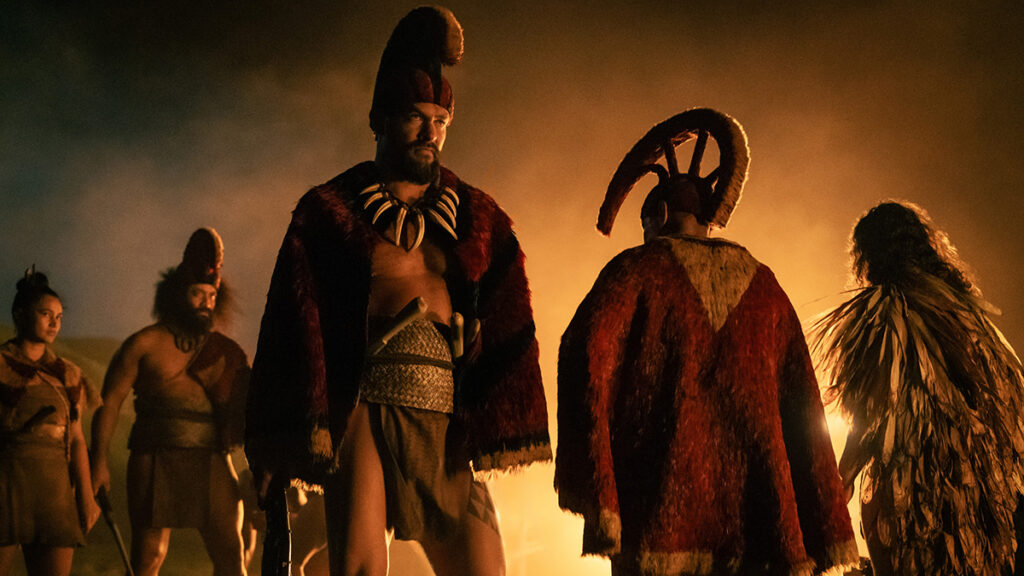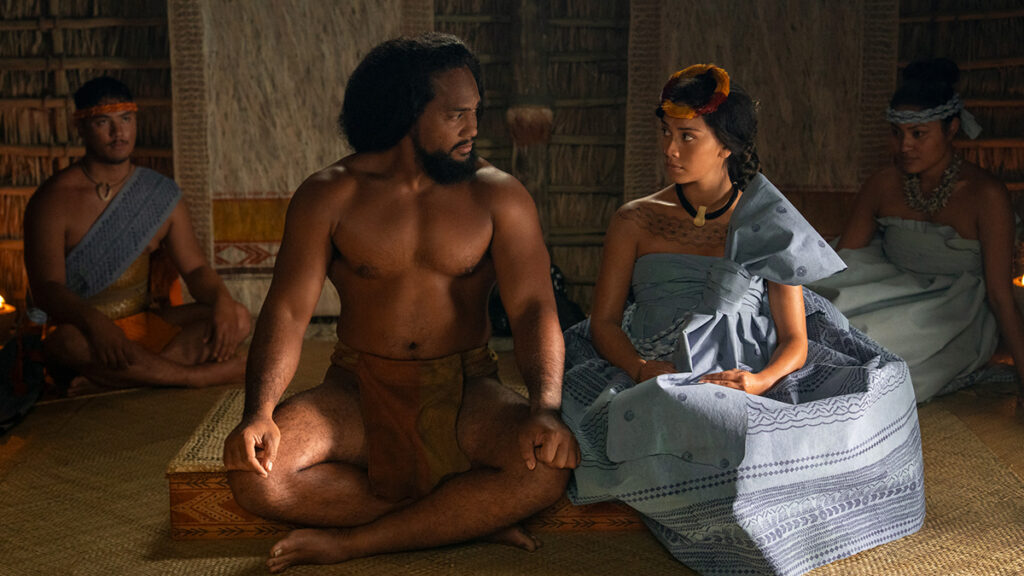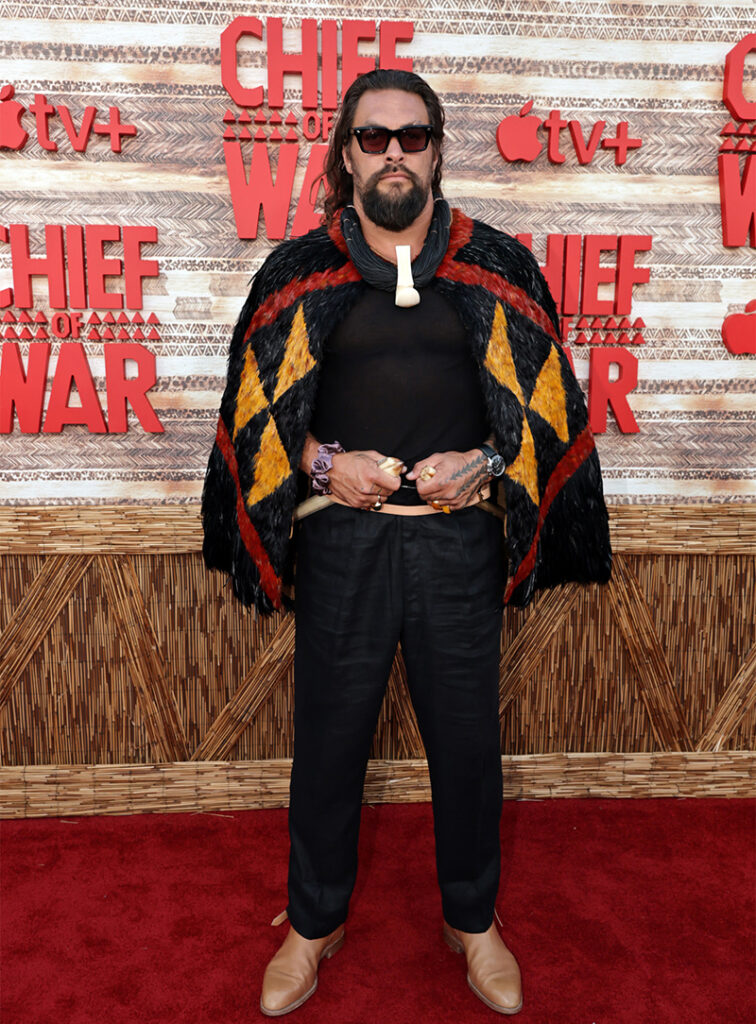By Kai Curry
NORTHWEST ASIAN WEEKLY
 “This is the pinnacle of my career,” Jason Momoa told the Northwest Asian Weekly about his upcoming television show. “Chief of War” is a lifelong dream for Momoa and a years-long project for him and co-writer, Thomas Pa’a Sibbett. Both men also executive produced the show and Momoa has the starring role as “Ka’aina,” a figure based on history.
“This is the pinnacle of my career,” Jason Momoa told the Northwest Asian Weekly about his upcoming television show. “Chief of War” is a lifelong dream for Momoa and a years-long project for him and co-writer, Thomas Pa’a Sibbett. Both men also executive produced the show and Momoa has the starring role as “Ka’aina,” a figure based on history.
“Chief of War” is set in pre-colonial Hawai’i and boasts a mostly Polynesian and indigenous cast. It covers the period at the end of the 18th century when the warring kingdoms of the islands, of what is now the state of Hawai’i, were on the brink of unification. The people at the time hold close a prophecy that “a star with a feathered cape” (a comet) will signal “the rise of a great king,” explains a female voice at the start of the first episode. Naturally, this causes everyone to see this rising king at every turn and in every face, especially in important, high-ranking faces. And, also as one might expect, there are those who will use this prophecy to their advantage.

Jason Momoa as Ka’aina, backed by family members Kupuohi (Te Ao o Hinepehinga) (far left) and Nahi (Siua Ikale’o). Courtesy of Apple TV+.
Momoa’s role, “Ka’aina,” is based off of a man who has been called one of the most famous Hawaiians in the history of the islands, a Hawaiian chief, or “ali’i.” In the show, Ka’aina, the son of a war chief, has exiled himself from the army, and he and his family have taken temporary refuge on the island of Kauai (where the real Ka’aina was from). Right away, he is called back into service to participate in the machinations of King “Kahekili” (Temuera Morrison) of Maui. Ka’aina, though a great warrior (of course!), has a dislike for needless killing and even more so when done at the hands of a suspect ruler who probably does not have the islands’ best interests at heart.
“I will be in service of Kahekili again,” Ka’aina bemoans to his wife, “Kupuohi” (Te Ao o Hinepehinga). “No, you’ll be in service of the prophecy and the people,” she replies.

Kaina Makua (left) and Luciane Buchanan as future King Kamehameha and Queen Ka’ahumanu. Courtesy of Apple TV+.
Meanwhile…the Hawaiian islands are coalescing into what will be the “real” answer to the prophecy, which is the rise of the famous King “Kamehameha” (Kaina Makua) and his forward-thinking wife, Queen Ka’ahumanu (Luciane Buchanan)—I’m getting ahead of myself with the titles, but that’s where they’re headed. Kaina is a really interesting choice for the role of Kamehameha. He is a native Hawaiian who runs a nonprofit and has dedicated his life to coaching youth. The story goes that Momoa saw Makua at a canoe paddling regatta and offered him the role, which Makua fills with dignity and humanity. Momoa himself, of course, is the perfect person to play Ka’aina, who is bigger than life, fierce, yet also conflicted as to what his future holds. For Momoa, as he told the Northwest Asian Weekly, this was an unprecedented and never-to-be-matched opportunity to play his own ancestors. It is his life’s work, he said.
“It’s important to get it right.”
“Chief of War” is the first television series to showcase pre-colonial, indigenous Hawai’i, its culture, and its people. For both Sibbett and Momoa, it’s a vital vehicle for teaching younger generations.
“It’s very important for the next generation to see who we are, what we are made of, where we come from,” said Momoa. He and Sibbett are also excited to see where the youth will take the film and television industry from here. “Hopefully, we’ve just opened the door.”
Telling stories is crucial to Hawaiian culture. In fact, if you live there, you will soon learn the phrase, “talk story.” That is why Sibbett considers this medium of television to be ideal.
“For people from the Pacific, everything was [about] transmission,” Sibbett told the Northwest Asian Weekly. “Our stories are ancient and they’re told with meticulous care and layers.” Sibbett, who grew up in Olympia, Washington (and gave a hearty “shoutout to Seattle!”) was raised singing, dancing, and surrounded by stories. It’s integral to who he is and he’s thrilled to share that.

Jason Momoa attends the world premiere for “Chief of War” in O‘ahu, Hawai‘i on July 18. Courtesy of Apple TV+.
“Chief of War” is indeed a beautiful, sweeping story. For those that know the history, it’s a tribute. For those that don’t, it’s a gorgeous and intriguing introduction. Viewers will see, for the first time since the 1800s, what the islands of Hawai’i might have looked like before the increasing encroachment of larger and larger settlements. They will get a close look at what life was like for the royalty in particular, and the customs that they followed. They will hear the Hawaiian language throughout and witness priceless Hawaiian artifacts being used and worn by Momoa and the rest of the cast. They will see Momoa wrestle a shark (because that’s a must), and they will see lots and lots of bare bottoms from the men in traditional loincloths.
The women, however, are clothed in Hawaiian print bodices, which might be a small concession to modernity and the one place where total authenticity was not practiced. While Hawaiian women did know of European clothing in the 1700s, they were not mandated by missionaries to cover themselves until later. The other aspect of “Chief of War,” which is also slightly problematic, imho, is that many of the cast are not native Hawaiian. They are Polynesian—mainly Māori from New Zealand, where the show was also largely filmed. Momoa himself is part native Hawaiian and part Samoan (I mean, yes, he totally qualifies). The cast is nearly entirely Polynesian which is in itself a great feat, worthy of commendation. I only wish that more had been Hawaiian as, for me, and maybe for others, New Zealanders have quite a different way of carrying themselves and are immediately identifiable as not Hawaiian. There are some very famous faces, such as that of Māori-descended Cliff Curtis, who plays “Keoua,” that took me out of the story. Surely more native Hawaiians could have been recruited in the way that Makua was.
“Chief of War” will pull you in from the start. It is a story worthy of telling, and a story that needs to be told. A story in the works for nearly a decade, but also for 200 years. Only by learning from our past can we truly move forward with wisdom. One of the main themes of “Chief of War” is the importance of knowing yourself. As Sibbett told the Northwest Asian Weekly, for generations, Hawaiians were told by others who and how to be. Now, perhaps more than ever, native Hawaiians have a chance to define themselves and to say, “This is who we are.”
“Chief of War” premieres on Aug. 1 on Apple TV+.
Kai can be reached at newstips@nwasianweekly.com.
